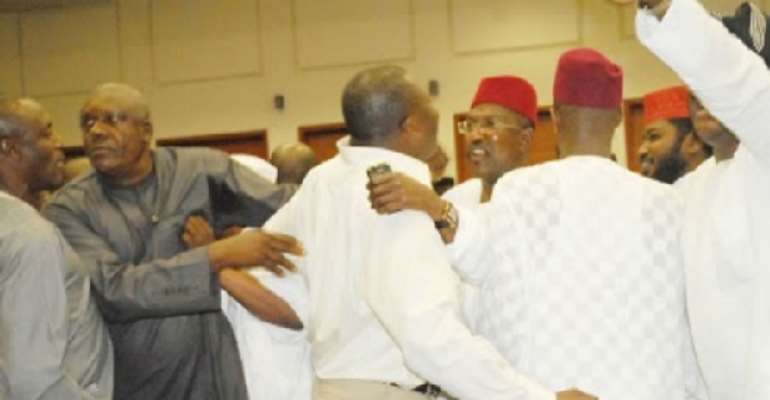Civil Society Group Condemns Lingering Crisis At National Assembly

SAN FRANCISCO, June 25, (THEWILL) – The Civil Society Legislative Advocacy Centre (CISLAC) said on Thursday that it is worried by the ongoing lingering crisis emanating from persistent undemocratic and self-centred struggles for leadership positions in both National and State Houses of Assembly.
Executive Director, CISLAC, Auwal Ibrahim Musa (Rafsanjani), expressed the worry in an address he delivered at the National Assembly Complex Abuja on the leadership crisis in the National and State Houses of Assembly
Rafsanjani lamented that while the citizens expect the legislators to discharge such fundamental functions as lawmaking, oversight, representation, constituency outreach and accountability to impact positively on their well-being and the nation's democracy, the legislative arm has been thrown into endless crisis arising from disagreement over the elections and appointments into leadership positions in the National Assembly.
According to him, “The phenomenon is fast becoming a priority over the legislators' fundamental assignments.”
He stated further: “CISLAC is aware of the crisis rocking the All Progressives Congress (APC) arising from tussle for the leadership of the National Assembly, which if unresolved might feature in the State Houses of Assembly as it is presently taking turn in Benue State House of Assembly, where legislators engage each other in a battle of the fists.
“While it is no more news that some citizens are less informed about legislative activities, the ongoing crisis if handled with levity, will not only project the legislature in bad light before the electorate, but also to a large extent undermine the ability of the legislature to work effectively thus laying the ground for gross under-performance by the legislature.
“As the citizens have hitherto suffered from era of bad governance and impunity, they are left in endless hope that the present administration would provide them with expected democratic dividends. However, the crisis is currently hindering effective functionality of the administration, and may wrongly position the legislature before the public and lead to a betrayal of trust that will further impair the already damaged reputation of the National Assembly.
“As representatives of the people not only do legislators derive their mandate directly from the electorate, but also owe the electorate accountability for their conduct in the legislature. An effective legislator must strive to contribute to good governance by performing important functions that are necessary to sustain democracy in this complex and diverse country, rather than needless leadership crises.
“Since the legislature is designed to work through constructive inputs, positive relationship, and adequate supports among the members, the ongoing crisis, if it remains persistent may impede effective collaboration, participation and team spirit among the members.
“The APC as a ruling party has not managed this in a manner that will enhance the confidence of the people that it is capable of delivering good governance. While it is understandable that it should decide to a large extent who among its members should hold key positions, it must not insist in a contest in a legislature that has only a marginal majority. It can expect its words to be final especially in the situation in which it has often preferred to dispense with internal democracy in favour of control by leaders.
“Indeed the ongoing development in the National Assembly could be traced to inability and weak internal control system by the leadership of APC to inculcate discipline in its members, revealing lack of internal democracy. In the end, APC must be reminded that Nigerians voted it not for its members to engage in needless leadership struggle but to serve the needs of the population that has witnessed unmitigated governance disaster in the last years.
“We believe that the most recent development leading to the emergence of the new leaderships in the National Assembly would serve as a lesson to all political parties to prioritise adequate internal control and inculcate discipline in its members through observance of internal democracy. We demand that such development should be embraced in the interest of nation's democracy.”
CISLAC therefore appealed to the legislators at both National and State Houses of Assembly to shun needless leadership crisis and focus on the development of well-articulated and constructive legislative agenda that will positively affect the well-being and standards of living of the citizens, and governance in the country.
Maintaining that the National Assembly has the sole responsibility to promptly address the ongoing crisis and avert unwarranted repetition and consequence in the State Houses of Assembly, it strongly urged that the ongoing crisis in the National Assembly be addressed within the legislative Code of Conduct to promote value of excellence, professionalism in the legislators' performance; and ensure civility and responsible conduct inside and outside of the National Assembly to commensurate with the trust placed in legislators by the electorate.
“We call on the elected members to reach out to the aggrieved legislators and maintain peace within their party to avert conflict between private interests and official duties and uphold effective functionality of the Presidency in the best interest of the nation.
“We urge the APC to realise that Nigerians are not interested in who are legislative leaders but what can the party do to ensure that the legislature works hand-in-hand with the presidency to deliver their campaign promises of providing responsive and responsible governance that is prudent and corrupt-free.
“We charge the elected and the appointed principal officers in the National Assembly on constructive dialogue and reconciliation with the aggrieved and their political party opposition members, and collaboratively exercise their fundamental mandates — lawmaking, oversight and representation, in the interest of peace, harmony and democracy of the country.
“CISLAC would be happy to continue to provide support to the members of the National and State Assembly to enhance efficiency in the conduct of the core legislative duties — lawmaking, oversight, representation and constituency outreach,” it said.
